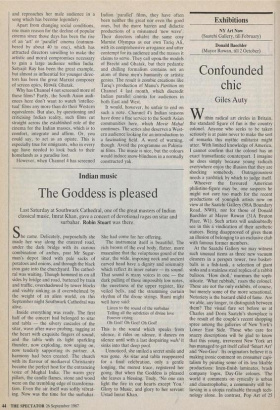Indian music
The Goddess is pleased
Last Saturday at Southwark Cathedral, one of the great masters of Indian classical music, Imrat Khan, gave a concert of devotional ragas on sitar and surbahar. Robin Stuart was there.
She came. Delicately, purposefully she made her way along the cratered road, under the dark bridge with its curious combination of arches, past Mr Sugar- man's depot lined with pale sacks of potatoes and onions, and through the black iron gate into the churchyard. The cathed- ral was waiting. Though hemmed in on all sides by bridge and road, battered by train and traffic, overshadowed by tower blocks and visibly sinking as if overwhelmed by the weight of an alien world, on this September night Southwark Cathedral was alive.
Inside everything was ready. The first half of the concert had belonged to sitar and tabla — the silvery cascades of the sitar, wave after wave probing, tugging at the heart with exquisite fingers of sound, and the tabla with its light sparkling thunder, now exploding, now urging on, now tenderly supporting its partner. A harmony had been created. The church with its flavour of mediaeval Christianity became the perfect host for the entrancing voice of Mughal India. The warm grey pillars, the candle flames, stone and wood were on the trembling edge of transforma- tion. Even the air itself was softly vibrat- ing. Now was the time for the surbahar. She had come for her offering. The instrument itself is beautiful. The rich brown of the oval body, flatter, more masculine that the voluptuous gourd of the sitar, the wide, imposing neck and ancient carved head have a dignity and solemnity which reflect its inner nature — its sound. That sound is many voices in one — the dark pulling of those impossibly low notes, the sweetness of the upper register, like veiled bells, and the strumming curtain rhythm of the drone strings. Rumi might well have said:
Listen to the sound of the surbahar Telling all the subtleties of divine love Forever crying Oh God! Oh God! Oh God!
This is the sound which speaks • from silence, it rides on silence, it dances on silence until with a last despairing wall! it sinks into that deep pool.
Unnoticed, she smiled a secret smile and was gone. As sitar and tabla reappeared for a final celebration, only a gentle longing, the merest trace, registered her going. But when the Goddess is pleased she leaves a blessing. Truly, 'No one can light the fire in our hearts except You.' Glory to Music, and glory to her servant Ustad Imrat Khan.






























































 Previous page
Previous page